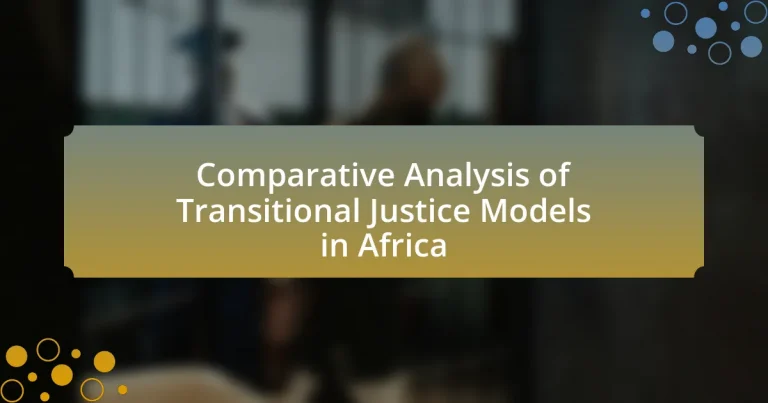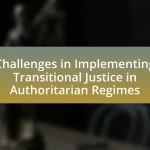The article provides a comparative analysis of transitional justice models in Africa, focusing on key mechanisms such as truth commissions, reparations programs, and hybrid courts. It examines the differences in approaches to accountability, reconciliation, and victim participation across various countries, highlighting the characteristics of restorative and retributive justice. The article also discusses the importance of transitional justice for peacebuilding, human rights protection, and the challenges faced in implementation, including political factors and socio-economic barriers. Additionally, it emphasizes the role of local and international actors, public perception, and education in shaping transitional justice outcomes, while offering insights into best practices and practical steps for stakeholders to enhance these processes across the continent.
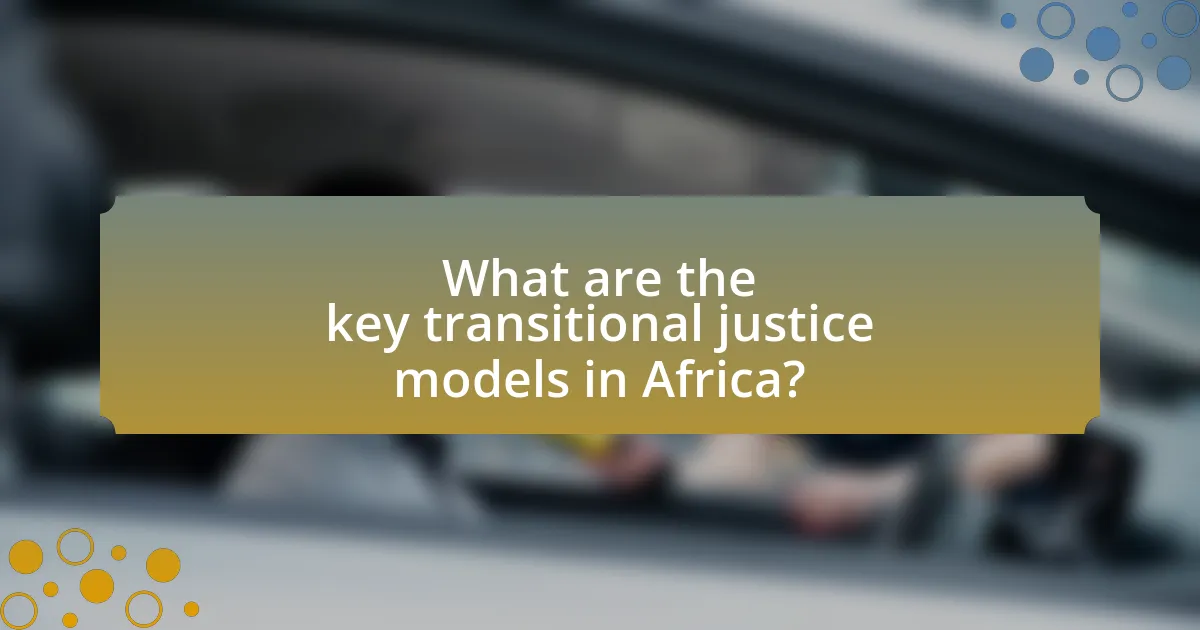
What are the key transitional justice models in Africa?
The key transitional justice models in Africa include truth commissions, reparations programs, and hybrid courts. Truth commissions, such as South Africa’s Truth and Reconciliation Commission, aim to uncover past human rights violations and promote national healing. Reparations programs, like those implemented in Uganda, provide compensation to victims of conflict and violence. Hybrid courts, exemplified by the Special Court for Sierra Leone, combine international and domestic legal frameworks to address war crimes and promote accountability. These models are essential for addressing legacies of violence and fostering reconciliation in post-conflict societies across the continent.
How do these models differ from one another?
Transitional justice models in Africa differ primarily in their approaches to accountability, reconciliation, and victim participation. For instance, the South African Truth and Reconciliation Commission emphasized restorative justice through public hearings and amnesty for perpetrators, aiming to foster national unity. In contrast, the Rwandan model focused on punitive measures, utilizing gacaca courts to address genocide crimes, prioritizing justice over reconciliation. Additionally, the Sierra Leone model incorporated hybrid courts, blending international and local legal practices to enhance legitimacy and address complex war crimes. These differences reflect varying historical contexts, societal needs, and political landscapes across African nations, influencing the effectiveness and acceptance of each model.
What are the main characteristics of restorative justice in Africa?
Restorative justice in Africa is characterized by community involvement, emphasis on healing, and a focus on reconciliation rather than punishment. Community involvement is crucial as it engages local stakeholders in the justice process, allowing victims, offenders, and community members to participate in dialogue and decision-making. This approach fosters a sense of ownership and responsibility within the community. The emphasis on healing is evident in the restorative justice practices that prioritize the emotional and psychological recovery of victims, aiming to restore relationships and social harmony. Additionally, the focus on reconciliation seeks to mend the social fabric torn by conflict, promoting forgiveness and understanding between parties. These characteristics are supported by various initiatives across the continent, such as the Truth and Reconciliation Commissions in South Africa, which aimed to address past injustices while fostering national unity.
How does retributive justice manifest in African contexts?
Retributive justice in African contexts often manifests through formal legal systems and traditional practices that emphasize punishment for wrongdoing. In many African countries, such as South Africa and Rwanda, post-conflict justice mechanisms have incorporated retributive elements to address crimes committed during periods of violence. For instance, the International Criminal Tribunal for Rwanda was established to prosecute those responsible for the 1994 genocide, reflecting a commitment to holding individuals accountable for their actions. Additionally, in countries like Uganda, the use of military courts to try war crimes demonstrates a reliance on punitive measures to restore order and justice. These examples illustrate how retributive justice is operationalized in African contexts, balancing formal legal frameworks with traditional expectations of accountability.
What role does reparative justice play in transitional justice models?
Reparative justice plays a crucial role in transitional justice models by addressing the harms suffered by victims of conflict or repression through restitution, compensation, and acknowledgment of their suffering. This approach aims to restore dignity and facilitate healing for individuals and communities affected by past injustices, thereby promoting social cohesion and reconciliation. For instance, in South Africa’s Truth and Reconciliation Commission, reparative measures included financial compensation and public acknowledgment of victims’ experiences, which were essential for fostering a sense of justice and moving forward post-apartheid. Such reparative actions are integral to transitional justice as they not only seek to rectify past wrongs but also contribute to the establishment of a more just and equitable society.
Why is transitional justice important for African nations?
Transitional justice is important for African nations because it addresses legacies of human rights abuses and fosters reconciliation. By implementing mechanisms such as truth commissions, reparations, and legal accountability, African nations can confront past injustices, promote healing, and establish the rule of law. For instance, South Africa’s Truth and Reconciliation Commission successfully facilitated dialogue and acknowledgment of apartheid-era atrocities, contributing to national unity. Additionally, the International Criminal Court’s involvement in cases like those in Kenya highlights the global commitment to accountability, reinforcing the necessity of transitional justice in preventing future conflicts and promoting democratic governance.
How does transitional justice contribute to peacebuilding in post-conflict societies?
Transitional justice contributes to peacebuilding in post-conflict societies by addressing past human rights violations and fostering reconciliation among affected communities. This process often includes mechanisms such as truth commissions, reparations, and criminal prosecutions, which aim to acknowledge victims’ suffering and hold perpetrators accountable. For instance, the Truth and Reconciliation Commission in South Africa played a crucial role in promoting national unity and healing after apartheid by allowing victims to share their experiences and facilitating dialogue between conflicting parties. Such initiatives help to restore trust in institutions, promote accountability, and create a foundation for sustainable peace, as evidenced by the reduction of violence and increased social cohesion in societies that have implemented effective transitional justice measures.
What impact does transitional justice have on human rights protection?
Transitional justice significantly enhances human rights protection by addressing past abuses and promoting accountability. Mechanisms such as truth commissions, reparations, and criminal prosecutions serve to acknowledge victims’ suffering, deter future violations, and foster societal healing. For instance, South Africa’s Truth and Reconciliation Commission facilitated a national dialogue on human rights violations during apartheid, leading to greater awareness and legal reforms that strengthened human rights protections. Additionally, studies indicate that countries implementing transitional justice measures experience improved human rights conditions, as seen in post-conflict nations like Sierra Leone and Rwanda, where such frameworks contributed to rebuilding trust in institutions and promoting rule of law.
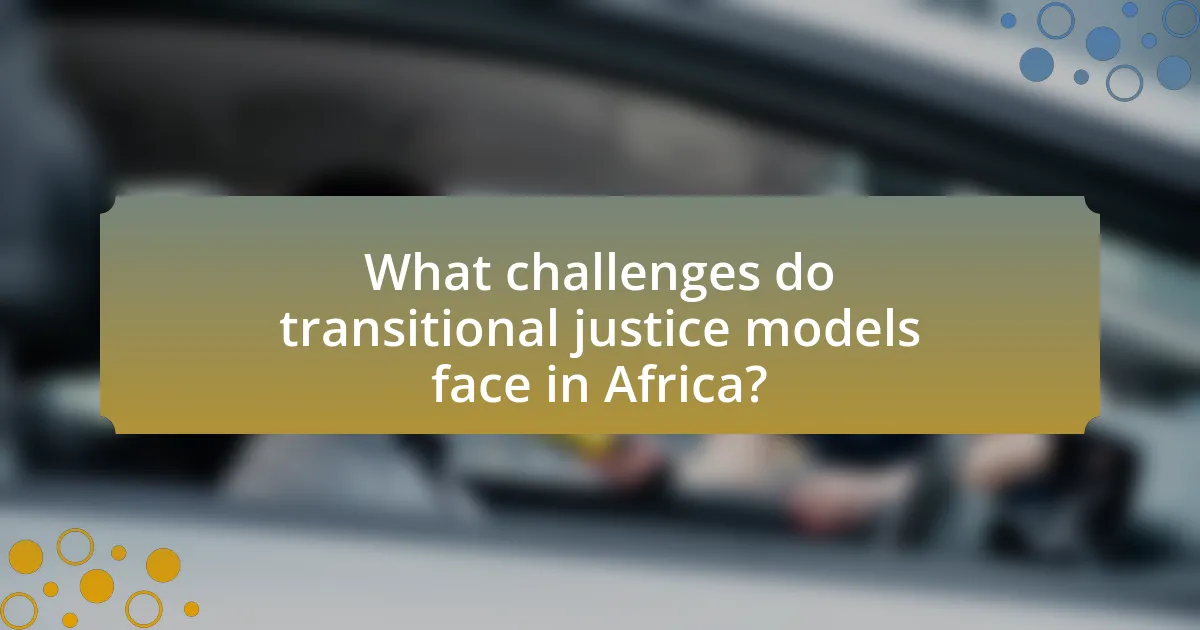
What challenges do transitional justice models face in Africa?
Transitional justice models in Africa face significant challenges, including political instability, lack of resources, and societal divisions. Political instability often undermines the implementation of justice mechanisms, as seen in countries like Sudan, where ongoing conflict hampers accountability efforts. Additionally, limited financial and institutional resources restrict the capacity to conduct thorough investigations and support victims, evident in nations like the Central African Republic. Societal divisions, often rooted in ethnic or political lines, complicate reconciliation processes, as observed in Rwanda post-genocide, where deep-seated mistrust persists. These factors collectively hinder the effectiveness of transitional justice initiatives across the continent.
How do political factors influence the effectiveness of these models?
Political factors significantly influence the effectiveness of transitional justice models in Africa by shaping the political will and institutional support necessary for their implementation. For instance, in countries where political leaders prioritize reconciliation and accountability, such as South Africa post-apartheid, transitional justice mechanisms like the Truth and Reconciliation Commission have been more successful in fostering societal healing and trust. Conversely, in nations with ongoing political instability or authoritarian regimes, such as Sudan, the lack of political commitment often leads to the failure of justice initiatives, as seen with the stalled implementation of the Darfur Peace Agreement. This correlation between political context and the success of transitional justice models underscores the critical role that governance and political dynamics play in determining their outcomes.
What role do local and international actors play in shaping transitional justice outcomes?
Local and international actors significantly influence transitional justice outcomes by providing resources, expertise, and legitimacy to the processes involved. Local actors, including victims’ groups and community leaders, shape the discourse around justice and accountability, ensuring that the needs and perspectives of affected populations are prioritized. For instance, in South Africa, the Truth and Reconciliation Commission was heavily informed by local narratives and experiences, which guided its recommendations and actions.
International actors, such as NGOs and foreign governments, contribute by offering financial support, technical assistance, and frameworks for best practices. Their involvement can enhance the credibility of transitional justice mechanisms, as seen in the role of the International Criminal Court in promoting accountability for war crimes in various African nations. The interplay between these local and international influences often determines the effectiveness and acceptance of transitional justice initiatives, as evidenced by the mixed outcomes in countries like Rwanda and Sierra Leone, where both types of actors played pivotal roles in shaping the justice landscape.
How does public perception affect the implementation of transitional justice?
Public perception significantly influences the implementation of transitional justice by shaping the legitimacy and effectiveness of justice mechanisms. When the public supports transitional justice initiatives, it fosters a conducive environment for their acceptance and success, as seen in countries like South Africa, where widespread support for the Truth and Reconciliation Commission facilitated its operations. Conversely, negative public perception can lead to resistance, undermining efforts to address past injustices, as evidenced in countries like Kenya, where skepticism about the International Criminal Court’s role has hindered accountability measures. Thus, public perception acts as a critical determinant in the successful enactment and sustainability of transitional justice processes.
What are the socio-economic barriers to effective transitional justice?
Socio-economic barriers to effective transitional justice include poverty, inequality, and lack of access to education and resources. These factors hinder individuals’ ability to participate in justice processes, as financial constraints limit their access to legal representation and support services. For instance, in many African countries, high levels of poverty can prevent victims from engaging with transitional justice mechanisms, as they prioritize immediate survival over participation in lengthy legal processes. Additionally, systemic inequality can marginalize certain groups, making it difficult for them to voice their grievances or seek redress. Research indicates that in post-conflict societies, such as those in Sierra Leone and Rwanda, socio-economic disparities significantly impact the effectiveness of transitional justice initiatives, as marginalized communities often remain excluded from the benefits of these processes.
How does poverty impact access to justice in transitional settings?
Poverty significantly hinders access to justice in transitional settings by limiting individuals’ ability to afford legal representation and navigate complex legal systems. In many transitional contexts, such as post-conflict societies in Africa, impoverished populations often lack the financial resources necessary to engage with formal justice mechanisms, which can lead to a reliance on informal or corrupt systems. For instance, a study by the United Nations Development Programme highlights that low-income individuals are disproportionately affected by legal fees, court costs, and the inability to take time off work to attend legal proceedings, resulting in a lack of equitable access to justice. This systemic barrier perpetuates cycles of injustice and inequality, undermining the effectiveness of transitional justice initiatives aimed at fostering accountability and reconciliation.
What is the relationship between education and awareness of transitional justice processes?
Education significantly enhances awareness of transitional justice processes by providing individuals with the knowledge necessary to understand their rights and the mechanisms available for addressing past injustices. Studies indicate that higher levels of education correlate with increased public engagement in transitional justice initiatives, as educated individuals are more likely to seek information and participate in discussions about justice and reconciliation. For instance, research conducted by the International Center for Transitional Justice shows that communities with better educational resources demonstrate a greater understanding of transitional justice concepts, leading to more active participation in related processes. This relationship underscores the importance of education in fostering informed citizenry capable of advocating for justice and accountability in post-conflict societies.
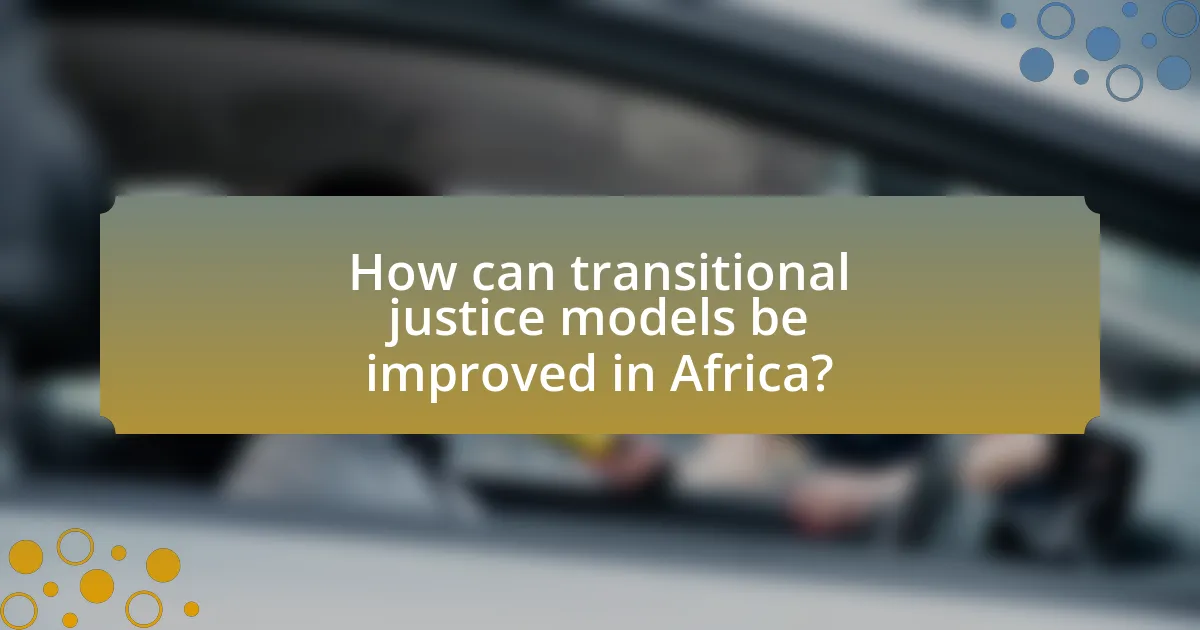
How can transitional justice models be improved in Africa?
Transitional justice models in Africa can be improved by incorporating local cultural practices and community involvement into the processes. This approach acknowledges the unique historical and social contexts of African nations, which often differ significantly from Western models of justice. For instance, integrating traditional dispute resolution mechanisms, such as community-based reconciliation processes, can enhance legitimacy and acceptance among local populations. Research indicates that when communities actively participate in transitional justice, as seen in South Africa’s Truth and Reconciliation Commission, the outcomes are more effective in fostering healing and social cohesion. Additionally, ensuring that transitional justice mechanisms are inclusive of marginalized groups, such as women and youth, can address historical injustices and promote broader societal healing.
What best practices can be adopted from successful transitional justice initiatives?
Successful transitional justice initiatives adopt several best practices, including inclusive participation, accountability mechanisms, and a focus on truth-telling. Inclusive participation ensures that all affected communities, including marginalized groups, have a voice in the process, which fosters legitimacy and ownership. For instance, the Truth and Reconciliation Commission in South Africa involved diverse stakeholders, enhancing public trust in the outcomes. Accountability mechanisms, such as legal prosecutions and reparations, are crucial for deterring future violations; the International Criminal Tribunal for Rwanda exemplifies this by holding perpetrators accountable for genocide. Lastly, a focus on truth-telling, as seen in the Sierra Leone Truth and Reconciliation Commission, helps to acknowledge victims’ experiences and promote healing, thereby contributing to societal reconciliation. These practices are supported by evidence from various successful transitional justice cases across Africa, demonstrating their effectiveness in fostering peace and stability.
How can community involvement enhance the effectiveness of transitional justice?
Community involvement enhances the effectiveness of transitional justice by fostering local ownership and ensuring that the processes reflect the needs and values of the affected populations. When communities actively participate in transitional justice mechanisms, such as truth commissions or reparations programs, they contribute to a more inclusive dialogue that addresses specific grievances and promotes healing. For instance, the South African Truth and Reconciliation Commission involved community members in testimonies, which not only validated individual experiences but also helped to build a collective narrative that facilitated national healing. This participatory approach has been shown to increase the legitimacy and acceptance of transitional justice outcomes, as evidenced by studies indicating that community engagement leads to higher satisfaction with the processes and results.
What role does education play in promoting transitional justice awareness?
Education plays a crucial role in promoting transitional justice awareness by equipping individuals with knowledge about human rights, historical injustices, and the mechanisms of justice. Through curricula that include the study of past conflicts and their resolutions, education fosters critical thinking and encourages civic engagement. For instance, educational programs in post-conflict societies, such as those implemented in Rwanda after the genocide, have been shown to enhance understanding of reconciliation processes and the importance of accountability. This approach not only informs citizens about their rights but also empowers them to participate actively in transitional justice initiatives, thereby contributing to societal healing and the prevention of future conflicts.
What lessons can be learned from comparative analyses of transitional justice in Africa?
Comparative analyses of transitional justice in Africa reveal several key lessons, including the importance of local context, the need for inclusive processes, and the effectiveness of hybrid models. Local context is crucial as it shapes the acceptance and success of transitional justice mechanisms; for instance, South Africa’s Truth and Reconciliation Commission was tailored to its unique historical and social landscape, which facilitated broader societal buy-in. Inclusive processes that engage various stakeholders, including victims, civil society, and marginalized groups, enhance legitimacy and effectiveness, as seen in Rwanda’s Gacaca courts, which aimed to involve communities in justice delivery. Additionally, hybrid models that combine traditional and formal justice systems can address local needs while maintaining international standards, exemplified by Sierra Leone’s Special Court, which integrated local customs into its proceedings. These lessons underscore the necessity of context-sensitive, participatory, and hybrid approaches in transitional justice efforts across Africa.
How can cross-country comparisons inform future transitional justice policies?
Cross-country comparisons can inform future transitional justice policies by identifying effective practices and pitfalls from diverse contexts. For instance, examining South Africa’s Truth and Reconciliation Commission reveals the importance of public participation and acknowledgment of victims’ experiences, which can enhance legitimacy in similar processes elsewhere. Conversely, the challenges faced in countries like Rwanda, where justice mechanisms were criticized for lacking inclusivity, highlight the need for comprehensive stakeholder engagement. Such comparative analysis allows policymakers to tailor approaches that consider local dynamics while learning from the successes and failures of other nations, ultimately leading to more effective and contextually relevant transitional justice frameworks.
What are the implications of these lessons for international organizations working in Africa?
The implications of lessons learned from transitional justice models in Africa for international organizations are significant, as they highlight the need for context-specific approaches. International organizations must recognize that one-size-fits-all solutions are ineffective; instead, they should tailor their strategies to the unique historical, cultural, and political landscapes of each African nation. For instance, the success of truth commissions in South Africa demonstrates the importance of local ownership and participation in the justice process, which can enhance legitimacy and effectiveness. Furthermore, the varying outcomes of transitional justice initiatives across the continent, such as in Rwanda and Sierra Leone, underscore the necessity for ongoing evaluation and adaptation of methods to ensure they meet the needs of affected communities. This adaptability can lead to more sustainable peace and reconciliation efforts, ultimately improving the impact of international organizations in the region.
What practical steps can stakeholders take to support transitional justice in Africa?
Stakeholders can support transitional justice in Africa by promoting inclusive dialogue among affected communities. This involves facilitating discussions that allow victims, perpetrators, and civil society to share their experiences and perspectives, fostering understanding and reconciliation. Additionally, stakeholders should advocate for the establishment of legal frameworks that ensure accountability for human rights violations, as seen in countries like South Africa, where the Truth and Reconciliation Commission played a crucial role in addressing past injustices. Furthermore, providing financial and technical support for local organizations engaged in transitional justice initiatives can enhance their capacity to implement effective programs. Engaging international bodies to monitor and support these efforts can also ensure adherence to global human rights standards, as demonstrated by the involvement of the African Union in various transitional justice processes across the continent.
